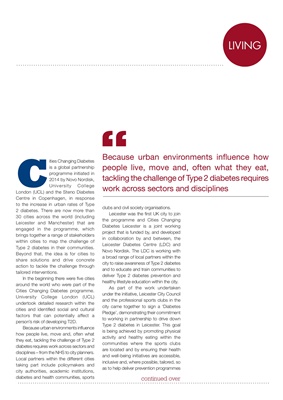
KITLIVING
"
Cities Changing Diabetes
is a global partnership
programme initiated in
2014 by Novo Nordisk,
University College
London (UCL) and the Steno Diabetes
Centre in Copenhagen, in response
to the increase in urban rates of Type
2 diabetes. There are now more than
30 cities across the world (including
Leicester and Manchester) that are
engaged in the programme, which
brings together a range of stakeholders
within cities to map the challenge of
Type 2 diabetes in their communities.
Beyond that, the idea is for cities to
share solutions and drive concrete
action to tackle the challenge through
tailored interventions.
In the beginning there were five cities
around the world who were part of the
Cities Changing Diabetes programme.
University College London (UCL)
undertook detailed research within the
cities and identified social and cultural
factors that can potentially affect a
person's risk of developing T2D.
Because urban environments influence
how people live, move and, often what
they eat, tackling the challenge of Type 2
diabetes requires work across sectors and
disciplines - from the NHS to city planners.
Local partners within the different cities
taking part include policymakers and
city authorities, academic institutions,
diabetes and health communities, sports continued over
clubs and civil society organisations.
Leicester was the first UK city to join
the programme and Cities Changing
Diabetes Leicester is a joint working
project that is funded by, and developed
in collaboration by and between, the
Leicester Diabetes Centre (LDC) and
Novo Nordisk. The LDC is working with
a broad range of local partners within the
city to raise awareness of Type 2 diabetes
and to educate and train communities to
deliver Type 2 diabetes prevention and
healthy lifestyle education within the city.
As part of the work undertaken
under the initiative, Leicester City Council
and the professional sports clubs in the
city came together to sign a 'Diabetes
Pledge', demonstrating their commitment
to working in partnership to drive down
Type 2 diabetes in Leicester. This goal
is being achieved by promoting physical
activity and healthy eating within the
communities where the sports clubs
are located and by ensuring their health
and well-being initiatives are accessible,
inclusive and, where possible, tailored, so
as to help deliver prevention programmes
Because urban environments influence how
people live, move and, often what they eat,
tackling the challenge of Type 2 diabetes requires
work across sectors and disciplines